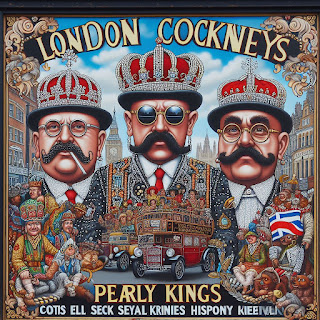Chillichap's Review - A Quick A to Z of Fawlty Towers John Cleese - 1970's British Comedy at it's Best
Hello!
When I was growing up in the 1970s, we just had three TV channels-BBC1. BBC2 and ITV. In my opinion, comedy was at its zenith with the likes of Morecambe and Wise, Porridge, Steptoe and Son, Benny Hill, and The Two Ronnies.... I could go on (and will probably review all of these separately). For a young lad growing up, life didn't seem to be that serious. My sense of humour developed on the back of these comedy greats. Perhaps my favourite sitcom at this time was Fawlty Towers. I loved John Cleese in the role of the ever-frustrated hotel manager, Basil Fawlty. He was skittish with an unbounding chaotic nervous energy. I'm now going to pay a short homage to this classic TV comedy program in a short A-Z, but will later come back and drill down on each of the characters in this show. I hope you enjoy it.
The A to Z of Fawlty Towers
Welcome to my A to Z guide to the iconic British sitcom, “Fawlty Towers.”
A - Audience Laughter
The audience's laughter was genuine in response to the show’s sharp wit and slapstick comedy. It was unfettered and sometimes was hilarious in its own right.
B - Basil Fawlty
The irritable hotel owner whose antics and temper are central to the show’s humor. Basil acted like he was constantly on the verge of a nervous breakdown and was restless. He seemed to take offense at everyone and everything that didn't fit with the perfect utopia in his mind's eye.
C - Cleese, John
The brilliant co-creator (with Connie Booth) and actor behind Basil Fawlty.
D - Dining Room
Many of the show’s most chaotic and classic scenes were set here. The poor guests and diners never really got any decent food or service.
E - Episodes
Sadly only 12 episodes were made, but these left a lasting impact on comedy.
F - Faulty Service
Service of the hotel's paying guests almost seemed almost like an afterthought leading to constant conflicts by unhappy customers.
G - Guests
Hardly any of the guests seemed 'normal', bringing their own foibles and issues to Fawlty Towers.
H - Hotel
Set in a fictional hotel in the seaside town of Torquay.
I - Innuendo
Clees and Booth were particular masters of using clever innuendo adding to the show’s adult humor.
J - Jokes
Jokes and one-liners were plenty and this included the way that somebody (perhaps the long-suffering paper boy had played about with the letters of the hotel sign)
K - Knockabout Farce
Physical comedy was a trademark of the show. I still shudder at the thought of O'Reilly being beaten by Sybil and her sturdy umbrella!
L - Legacy
There's no doubt that Fawlty Towers has influenced comedy and will continue to have an enduring legacy.
M - Manuel
Poor, poor Manuel-the kind-hearted, accident-prone Spanish waiter (he's from Barcelona), who is always on the tail-end of Basil's frustrations.
N - Narrative
Fawlty Towers raised the comedy bar for most other comedy sitcoms in the 70's and beyond.
O - Originality
Basil's character was groundbreaking-how could somebody treat his paying guests like this? Had he escaped from a mental asylum?
P - Prunella Scales
Basil's wife, Sybil Fawlty, They tolerated each other-just. She was efficient when she wanted to be, but was a tad lazy in my opinion.
Q - Quotability
Many lines from Fawlty Towers have become used in popular culture like 'Don't mention the war!' and 'I know nothing...'
R - Reception
In 1976 and 1980 the show won the British Academy Award for best scripted comedy.
S - Sybil Fawlty
See Prunella Scales. Sybil wasn't to be messed with and had a laugh like a donkey.
T - Torquay
Torquay was known as the English Riviera and inspired the show’s setting. Were there palm trees?
U - Unforgettable Moments
There are just too many of these. If I had to pick two, I'd say 'Basil the Rat' emerging from the biscuit tin in the dining room and Basil (the man, not Manuel's Siberian hamster) beating his car with a tree branch after it breaks down on 'Gourmet Night'.
V - Vaudeville
The show’s style of vaudeville comedy.
W - Writing
Witty, sharp, and clever sums up the writing that made the show such a success.
X - eXasperation
Most of the hotel's guests suffered exasperation and anxiety at the hands of Basil creating classic comedy tension. You genuinely felt sorry for some of the guests on occasions who were utter victims of Basil's personality and prejudices.
Y - Yelling
If in doubt, shout. Basil did a lot of this as did some of the guests in frustration of Basil's antics.
Z - Zeitgeist
Fawlty Towers perfectly captured the zeitgeist of the 1970s and is a time capsule that can be frequently reopened and revisited to catch a whiff of 1970s Britain.
Personal Reflection
- Favorite Aspects: For me, it was all about Basil and all the other characters were his foils, Yes, they were all great, but they served to bring his ever-bubbling frustration at life to the fore.
- Critique: I can't Fawlt it (see what I did there?). However, in this day and age, some of the humour would be seen as xenophobic and Fawlty's prejudices would be pulled apart by latter-day 'critics'.
Conclusion
- Final Thoughts: I love Fawlty Towers and all its characters. Would I ever want to stay there? No, but I'll visit again and again through the safe vestiges of my TV screen. Putting any politically correct objections aside, Fawlty Towers sits at the pinnacle of British humour in my humble opinion.
- Recommendation: I would definitely recommend “Fawlty Towers” to new viewers. But just remember, this was British life in the 1970s, and just appreciate comedy geniuses at work.




.jpg)

Comments
Post a Comment